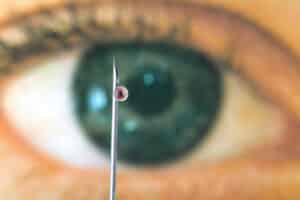The thought of a needle anywhere near our eyes will likely cause a cringeworthy reaction for most of us. But in the world of ophthalmology it’s a common occurrence; eye injections are the best way to deliver certain medications into the eye.
Eye injections are known as intravitreal injections and most often used to administer various medications into the eye for retinal conditions such as age-related macular degeneration, diabetic retinopathy and retinal vein occlusion. Tower Clock Eye Center surgeons also deliver medications into the eye via injection if a patient chooses dropless cataract surgery. Injections can also be used to introduce antibiotic, antiviral and anti-fungal medications to treat eye infections.
Eye Injections: What to expect
First things first – the needle used for intravitreal injections is a thin, small needle.
Eye injection procedures typically take about 20 minutes per appointment to complete. To start, your doctor will administer topical drops to prevent infection and to numb the eye. Some patients report a warm tingling sensation or slight pressure from the antiseptic/numbing medication placed on the eye. To allow the doctor to properly place the medication, patients will be asked to look in a specific direction to expose the outer, lower area of the eye. The needle is usually inserted through the sclera and the medication is delivered.

It is important to note that your vision will be affected following your appointment, and you will need someone to drive you home.
After leaving the office:
Most patients will experience some tearing and/or mild soreness for the next day following an intravitreal injection. Some patients also report the feeling of debris in their eyes. This is caused by the solution used to clean the eyes and is common.
Spot bleeding is also occasionally seen on the surface of the eye where the needle punctured a blood vessel. This subconjunctival hemorrhage doesn’t hurt and will heal in about a week.
After your appointment your doctor will place few, if any, restrictions on your activity. However, you shouldn’t wear contacts the rest of the day to prevent against infection.
If you experience any of the following issues following an intravitreal injection, please contact our office:
- Significant reduction in vision.
- Significant pain the in the eye
- Eye swelling or discharge
- Flashing lights
- Light sensitivity
If you have questions about intravitreal injections our office performs, or would like to schedule an appointment, please call 920 499-3102.
